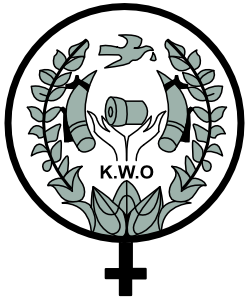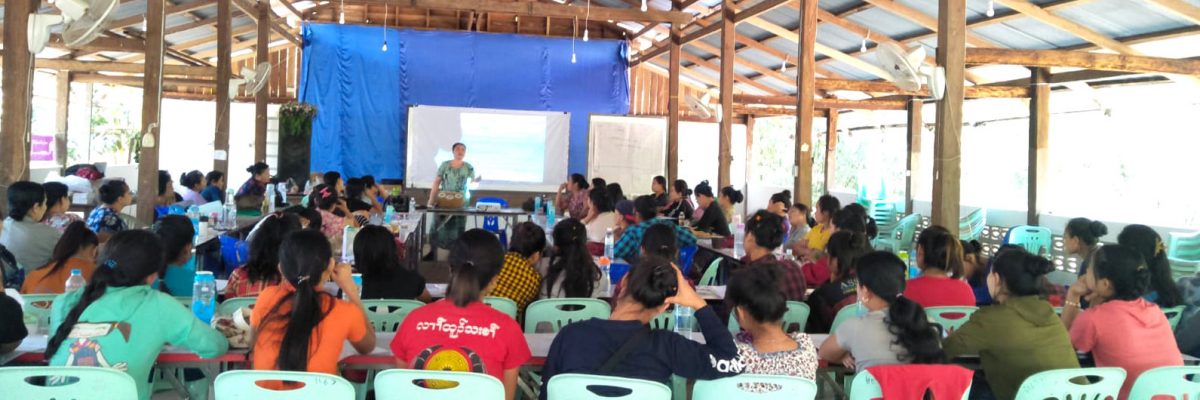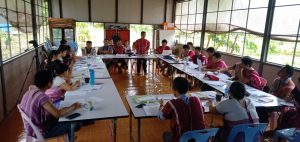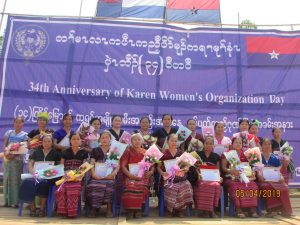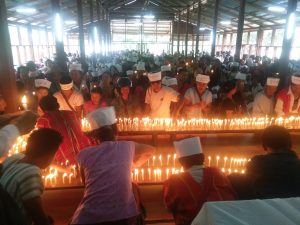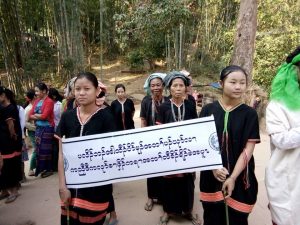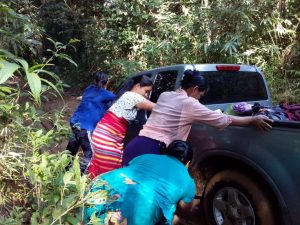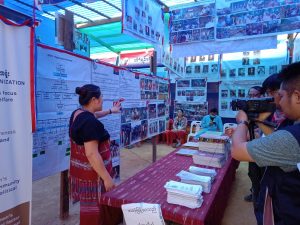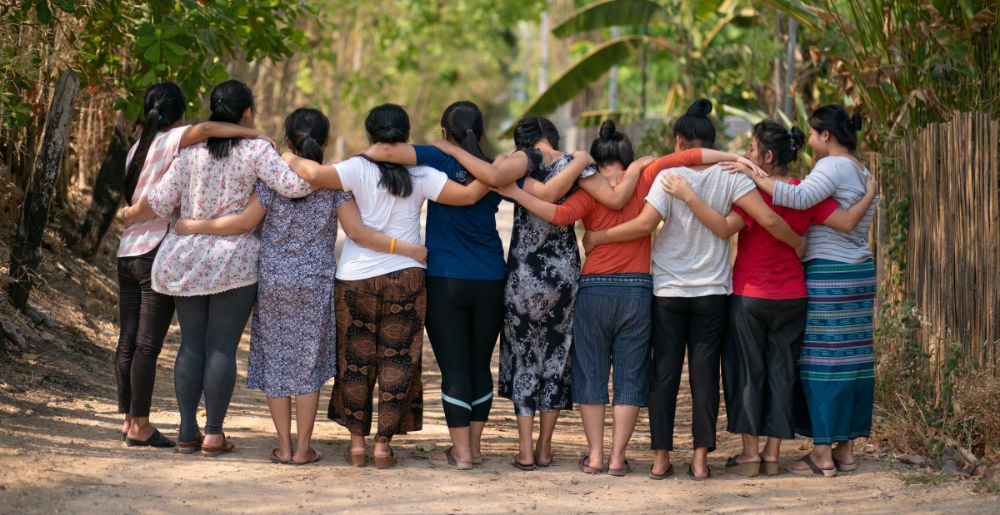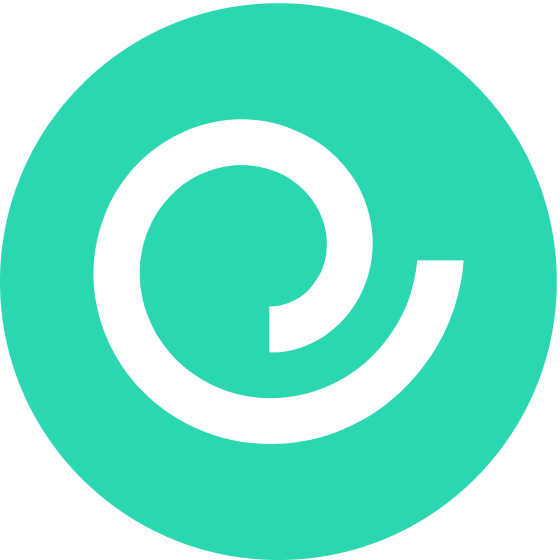KWO knows from experience that empowering women increases respect for human rights and reduces discrimination against women. We believe that women have a right to be properly represented in politics and society at large. And we believe that the whole community is better off when women play an equal role with men in decision-making.
1. Project Goal
To achieve KWO’s vision of a federal Burma, where all communities have gender equality, the protection and promotion of indigenous people’s rights, human rights, and justice.
2. Location
KWO carries out our work in the 7 Karen-majority refugee camps along the Thai-Burma border, and in the 7 districts of Karen State, Burma.
3. Overview
This project supports all of KWO’s core programming by securing funding and resources for overall organisational and operational costs. KWO organises our work under the 4 Programs: Organising and Information-Sharing Program, Education Program, Health Program, and Social Welfare Program. We have developed strategic priorities for each Program, through a process of consensus and consultation. Each Program has a work plan, provides community services, and conducts advocacy. There are many hundreds of elected KWO leaders living in the community, Program Co-ordinators and the Secretariat, with clear responsibilities to implement the organisation’s priorities and work plan. They all also monitor and support those separately funded KWO projects under their Programs which are implemented in their areas. We coordinate closely with existing community governance structures (majority male) and other local or international service providers.
There are currently more than 70,000 members of KWO across Karen State and in the refugee camps, and these women vote for the leadership in regular elections, and can stand for election too. KWO’s traditional role in our community is essentially one of community care-giving, but it is not limited to that. We provide services and we do advocacy for change. The services focus on community and family care-giving, assisting individuals in trouble. Our advocacy work focuses on getting more women into decision making positions in our community and improving daily life for women. We work hard to increase the voice and capacity of women in our community.
From January to December 2023, we have counted 140,582 direct beneficiaries of our work in the refugee camps and across the districts in Karen State. Really, there are many more than that in the wide community, who benefit from having the women’s voice in community planning and decision making. During this period, there were 950 Karen women leaders who received stipend support from this project for their full-time work. Hundreds of other women holding leadership positions with KWO in villages in Karen State also contributed to this effort without stipends.
4. Beneficiaries and Participants
In the 2023 project year, a total of 140,582 individuals in our community benefited directly from KWO programs and projects (70% female, and 30% male).
It’s very challenging for us to count all of the beneficiaries and participants in our community work. There are so many benefits for the broad community when women are more involved in decision-making, but we have not included all of them in our counting. Here we count only the people who attend trainings, take part in activities, go to schools, sleep in student dormitories or safe houses, receive home visits, consult in the drafting of documents, etc. Not included in our total number are all the family members, the wider community, and all the KWO leaders and staff who, as community members themselves, also benefit from the impact of KWO’s work.
- 31,443 people benefited from the Organising and Information Sharing Program activities and its Projects.
- 22,035 people benefited from the Education Program activities and its Projects.
- 11,363 people benefited from the Health Program activities and its Projects.
- 75,741people benefited from the Social Welfare Program activities and its Projects.
5. Main Activities
KWO’s activities are organised under our 4 Programs. Social Welfare Program, Education Program, Organising and Information Sharing Program, Health Program.
- Provide community care services.
- Advocate for change at local, state, national, and international levels.
- Participate in and influence community decision-making.
- Attend community meetings and events.
- Support funded projects’ activities.
- Conduct and provide scrutiny for elections.
- Work for organisational development and sustainability.
- Provide capacity building training to KWO elected leaders, appointed staff, community leaders, and community members.
- Create and produce IEC materials (Information, Education, Communication).
- Communicate with donors, seek new donors, fund-raising in the community.
- Co-ordinate with Community-Based Organisations, Non-Government Organisations, and UN agencies.
- Engagement with the local governance structures (eg Karen Education and Culture Department, KNU, Refugee Camp Committees).
6. Who does the work?
Here is another thing that is hard to count. KWO is a big team spread out over a huge area of land, but we share what we have, we hold similar values, and we manage to push in the same direction, towards equality and empowerment of women, and a better quality of life for the Karen people.
In 2023, more than 1,500 elected women leaders worked together to implement our women’s empowerment and community care and management work. Some of us received basic stipends and some are volunteers. Thousands of women and our KWO membership assisted. We live and work in villages in Karen State and in the refugee camps.
Another large group of women, who are the managers and staff of specific KWO projects, received stipends from those projects’ funds, and worked hand in hand to raise the Karen “Women’s Voice”.
7. The Impact
Without doubt the number of women who work in the community has greatly increased in the past 20 years, and the number of community leaders who are women has greatly increased. People attribute this positive change to KWO’s efforts. We see many more women active in decision-making processes in politics, in local governance, acting in the public sphere to address community needs and respect rights.
With greater gender equality, many essential community services provided by KWO and by other community groups are sustained. And those services are better, and fairer. Community members in crisis received more and better assistance. There is more power-sharing and as a result community governance is fairer, more transparent, and more inclusive.
More women can exercise more of their rights. There has been a big shift in the empowerment of women in the Karen community.
KWO provides a well-informed, high capacity, organisational voice to represent the needs and desires of the community. International Organisations, Governments, and donors need and want to hear from the women and the communities who are affected by the conflict in Burma. Their programs and advocacy are better as a result.
